Latino wave put Bernie Sanders on top in California
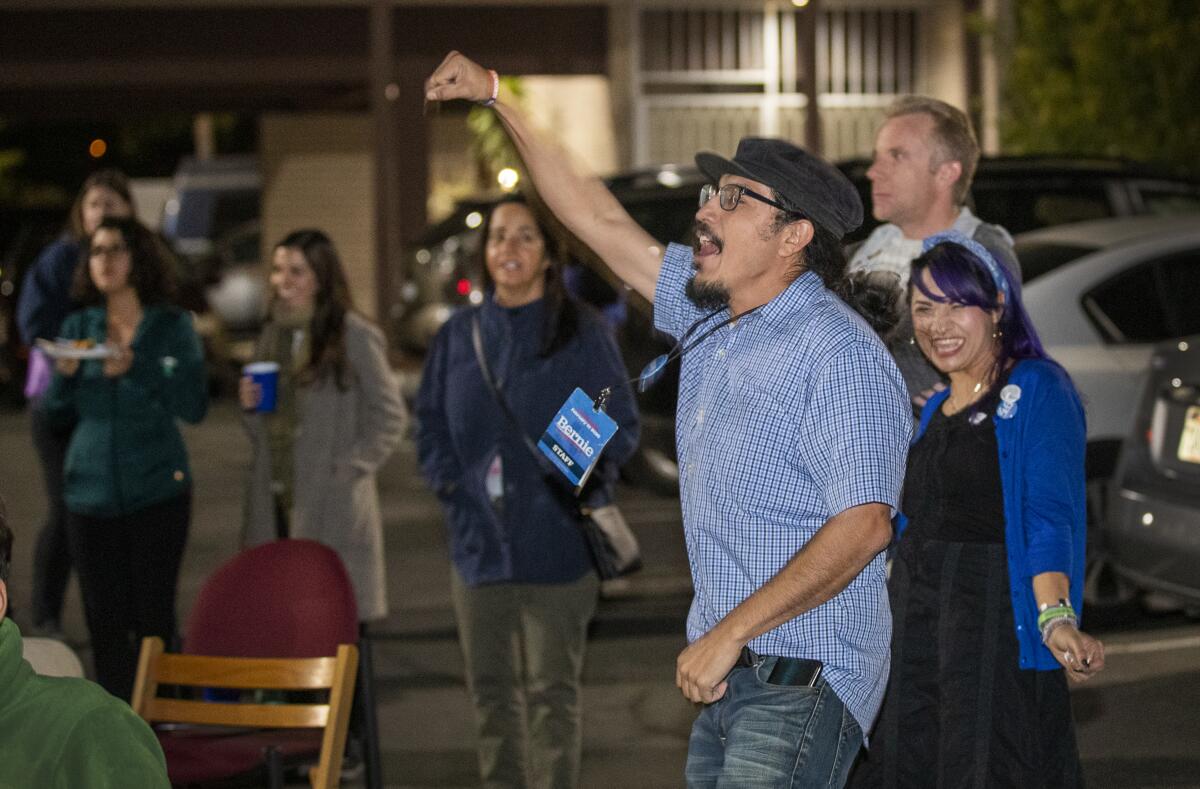
- Share via
Bespectacled, lanky, with an impressive ponytail and a Van Dyke beard, 35-year-old Joesé Hernandez is a reason why Bernie Sanders won California’s Democratic presidential primary.
He has spent most of his adult life in el movimiento, throwing himself into causes like citizenship classes and district elections in Anaheim. He hosts an online radio show and used to serve as an emcee for Santa Ana’s Day of the Dead festivities.
In 2016, the Santa Ana resident volunteered for the Vermont senator’s 2016 campaign — his first-ever foray into electoral politics. Hernandez gamely tried to get the city’s overwhelmingly Latino electorate to side with Sanders, an East Coast septuagenarian that few of those voters had ever heard of and who seemed to have no explicit plan to court voters of color.
That perception sank Sanders statewide: he lost the 2016 primary to Hillary Clinton by a 53-to-46% margin, and by an even larger gap among Latinos.
But this time, the Sanders camp in California tapped people like Hernandez — local activists that just happened to be Latino, with deep community connections — as field organizers and volunteers. They, in turn, asked their networks to come out and vote for someone who breathed the same progressive fire they had for years.
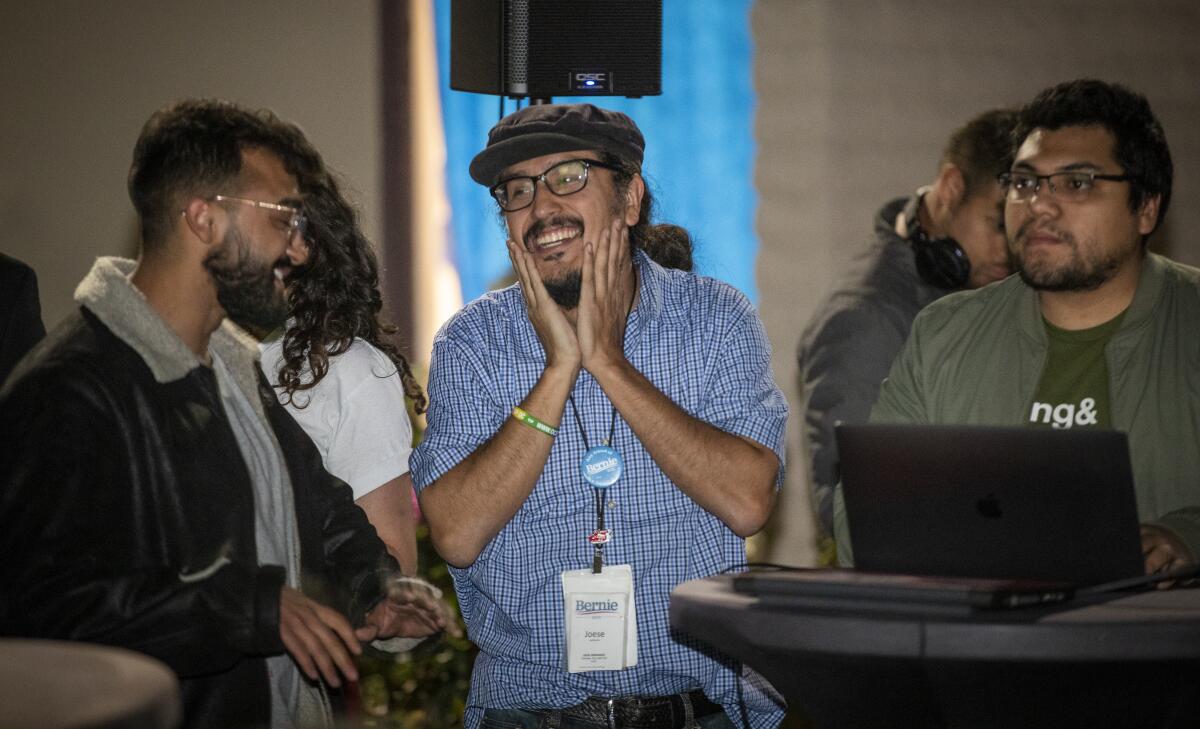
“That was transformational,” said Hernandez, now co-regional director for the Sanders campaign in Orange County, as a phalanx of phone bankers streamed into a field office in Santa Ana the evening before Election Day. They called prospective voters under signs that read “Sí Se Puede!” and “Finally a Reason to Vote” superimposed over an American flag and the bemused visage of Sanders.
“We know our comunidades,” Hernandez continued. “To hear Bernie talk about the issues we’ve struggled against for years — rent control, healthcare, income inequality — and win on it reaffirmed what we’ve fought for.”
Sanders’ appeal to young Latinos was well documented by pollsters and media alike, and helped him win the Golden State — a necessary victory that now pits him against a resurgent former Vice President Joe Biden, who won nine states on Super Tuesday, including the other large delegate prize, Texas.
On election day, many Latino voters spoke about what made Sanders so appealing.
“When you do the research, you see that ‘Tio Bernie’ is for the working class, for healthcare, for taxing billionaires, for standing up for the American people,” said Karen Cazares, 54, of Santa Clarita. “People get hung up on the ‘socialist’ thing, but he’s fighting for what we believe in.”
But for Latino voters who preferred other candidates, the socialist label made them, like others who chose more establishment Democrats, question whether he could defeat Trump. As Super Tuesday neared, the party establishment rallied behind Biden.
“A lot of young people don’t understand or have the history and it’s dangerous to have a pro-socialist candidate leading the party,” said Gabriel Orozco, 68, after casting his ballot for Biden in El Monte.
Still, the fact that Sanders is in what is now a two-man race against Biden is a testament to his campaign’s ability to stir Latinos — a virtual necessity for any candidate hoping to beat Trump — in delegate-rich California.
Some of his most fervent followers were people forged over the past generation’s political battles across the state. For them, a nonstop push for Sanders was just like any other day in their activist life. They were there in Sanders’ Santa Ana office, and they weren’t tired.
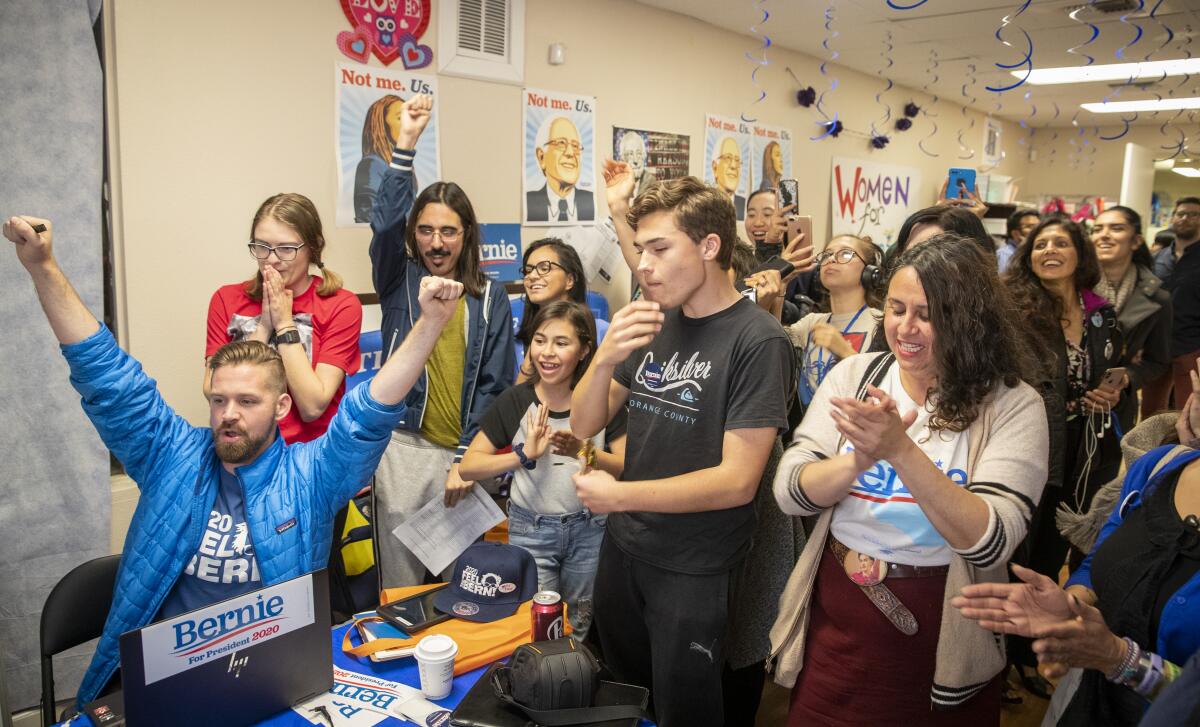
In the run-up to the election, artists Alicia Rojas and Jenny Lynn sat across from each other and read their scripts from smart pads. Both were first-time Sanders volunteers, but everyone seemed to know the two from their past efforts to beautify Santa Ana through murals.
“Bernie was smart about it,” said the 43-year-old Rojas. “Here, I see Occupy people, I see anti-gentrification people, and so many others. We’ve been motivated for something like this forever.”
“Sanders understands what it takes to organize on a grass-roots level,” added Lynn, 35. “Because there’s never been any grass-roots activism for centrist anything.”
Sanders frequently boasts about his small-fries strategy for winning the Democratic nomination, claiming the $34.5 million his campaign raised during the fourth quarter of 2019 — more than any of his opponents’ — averaged out to just $18.53 per donation. He hit that note again and again in speeches across California, speaking about issues that resonated locally even as their themes were national.
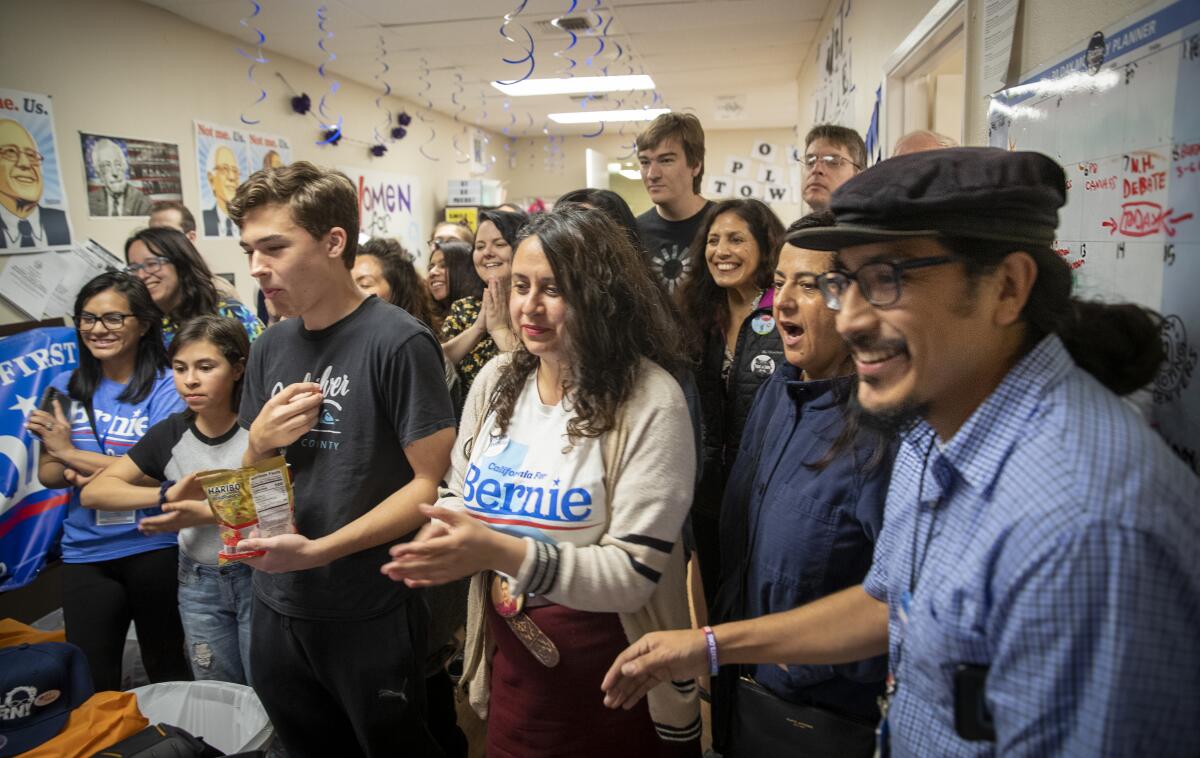
In East Los Angeles last fall, Sanders declared himself “the proud son of an immigrant”; in the working-class Bay Area city of Richmond last month, he touched on the Green New Deal as a way to revive depressed manufacturing towns. When Sanders visited Anaheim in 2018, he did so to hear about the plight of Disneyland-area hotel workers.
Meanwhile, Sanders’ top-level people left the activists they courted to campaign in their local communities largely on their own terms. They say that allowed them to win over voters.
“For voters to just know that I’m from here and say, ‘Hey, I’m just two streets behind you’ — it makes a difference in terms of authenticity,” said 24-year-old Elizabeth Lira, a Sanders field organizer in Fresno who previously worked for an educational nonprofit. “I’m not a stranger. I know the plight that we go through here.”
“I’ll go to people who I’ve worked with, and they directly ask me, ‘Do you believe that Bernie can be the pivot for healthy living?’” said Gustavo Aguirre Jr., a 31-year-old Sanders volunteer in Bakersfield who works for the Central California Environmental Justice Network. “And I tell them, ‘Yes.’ They trust me, because I’ve won that trust working on issues that matter to them.”
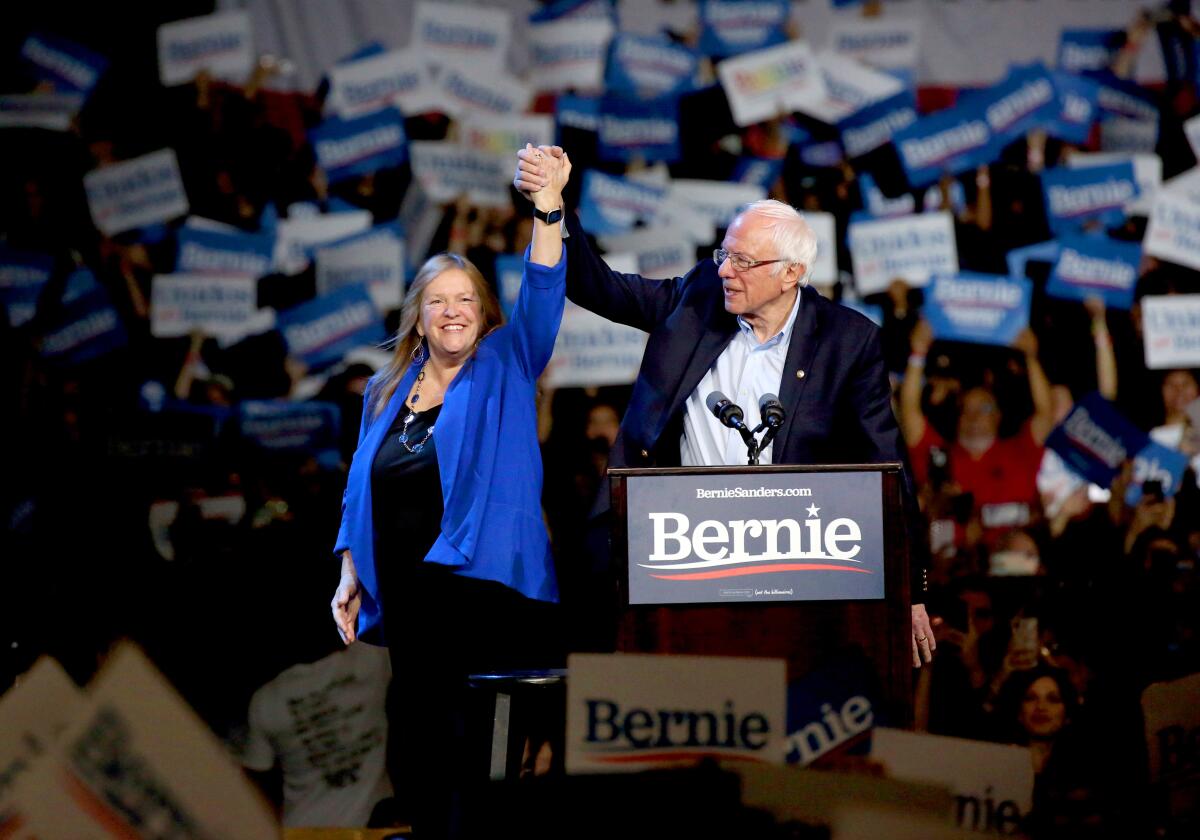
“These folks really understand the community in a deep, profound way,” said Rafael Návar, California director for the Sanders campaign. “They have the relationships. It has a multiplying effect that you can’t quantify.”
Návar experienced that phenomenon himself while knocking on doors in his native East Los Angeles and running into “a lot” of former classmates from Garfield High. “And they’d be like, ‘Absolutely, Rafa, I’ll vote for Bernie,’” he said with a laugh.
Since last year, the Sanders campaign aggressively sought the endorsements of Californians who had long worked on issues (frequently alongside each other) that are key to his candidacy: labor, gun control, LGBTQ and disability rights, and many more. On its website, it named over 150 “Community Leaders of California” who have backed the prospective Democratic nominee — a list nearly twice as long as the one for California politicians.
In taking that tack, Sanders also did something counterintuitive to woo the state’s large Latino electorate, said Cal State Fullerton Chicano studies professor Alexandro Jose Gradilla: he treated them as more than just their ethnicity.
“He didn’t do the ‘yo como un burrito’ thing — he’s seeing them as workers and students,” he said. “In 2016, that de-emphasis on race rubbed people the wrong way. But Sanders figured out doing the anti-identity politics thing now is the anti-Trump message that can win.
“For community organizers to really throw themselves into this,” Gradilla added, “means they believe in that message.”
One of those organizers is Riverside resident Anthony Victoria. In December, he told his origin story to Sanders before a town hall in Moreno Valley: how Victoria’s immigrant parents lost their house in Rialto during the Great Recession; how an explosion of warehouses in the Inland Empire and the subsequent air pollution led the 28-year-old to fight for environmental justice in the region.
A month later, the Sanders campaign asked Victoria for his public endorsement.
“When Bernie talks about these bigger issues, he’s talking about us in the Inland Empire, in the Central Valley,” he said. “We might not have the fancy title, but we know what’s going on in our community. Bernie, he’s not perfect, but he understands people power.”
Times staff writer Andrew J. Campa contributed to this report.
More to Read
Sign up for Essential California
The most important California stories and recommendations in your inbox every morning.
You may occasionally receive promotional content from the Los Angeles Times.










